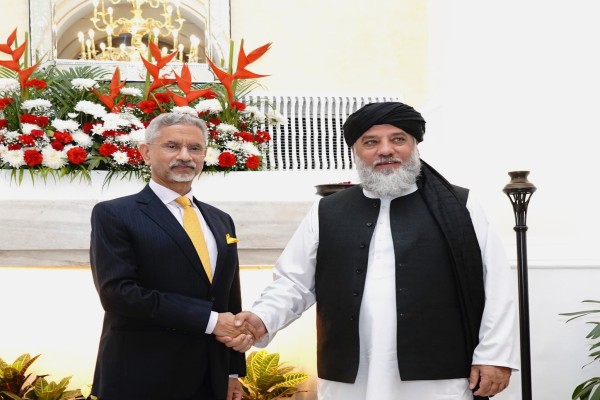
India and Afghanistan are sharpening their engagement on new supply chains and alternative trade corridors as Kabul faces a severe export disruption triggered by Pakistan’s closure of key border transit points. In wide-ranging discussions held in New Delhi on Thursday, both sides examined options to bypass Pakistan, ease the movement of goods, increase market access, and deepen long-term economic cooperation.
External Affairs Minister S. Jaishankar met Afghanistan’s Minister of Industry and Commerce Alhaj Nooruddin Azizi, who is leading a business delegation on a five-day visit. Jaishankar reiterated India’s commitment to Afghanistan’s development and welfare, while Azizi conveyed Kabul’s urgent need for dependable routes after Pakistan shut its border crossings on October 11.
The shutdown has halted Afghan exports for over a month, forcing Kabul to instruct traders to clear pending contracts within 90 days. Afghan officials have hinted they are prepared to reduce reliance on Pakistan, making India and Iran central to their revised commercial and connectivity strategy. India’s renewed U.S. sanctions waiver for the Chabahar Port has further strengthened this option, offering Afghanistan direct maritime access free of Pakistani control.
Azizi also visited the India International Trade Fair (IITF), where he was briefed by India Trade Promotion Organisation Managing Director Neeraj Kharwal on commercial opportunities and future participation. He met Afghan traders based in India to assess how trade volumes could be protected despite ongoing regional disruptions.
Beyond trade, development cooperation also featured in the talks. India’s earlier investments in Afghanistan—especially in hydropower—remain potential areas for renewed collaboration. Both governments have recently emphasised the need for sustainable water management and hydroelectric development, building on India’s role in projects like the Salma Dam.
The most consequential moment of Azizi’s visit will come on Friday, when he meets Commerce and Industry Minister Piyush Goyal. Afghan officials are expected to push two proposals: a dedicated India–Afghanistan air-cargo bridge and expanded Afghan use of the Chabahar maritime corridor. Kabul considers both essential to stabilise exports and shield its economy from Pakistan’s unpredictable border closures.
India, meanwhile, remains one of Afghanistan’s key suppliers of pharmaceuticals, machinery, textiles, tea and food products. At the same time, Afghanistan offers opportunities for Indian businesses in agriculture, mining and energy—sectors where Kabul is seeking foreign investment and where China has already advanced. The outcome of the Goyal–Azizi meeting is likely to determine the next phase of India–Afghanistan commercial engagement and could shape Kabul’s economic trajectory if new corridors receive policy clearance.




